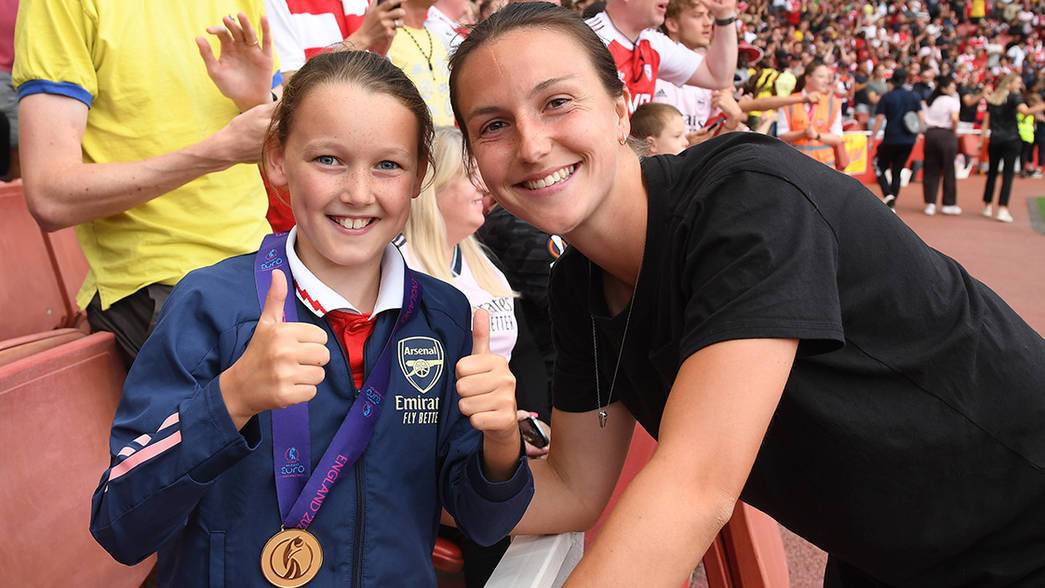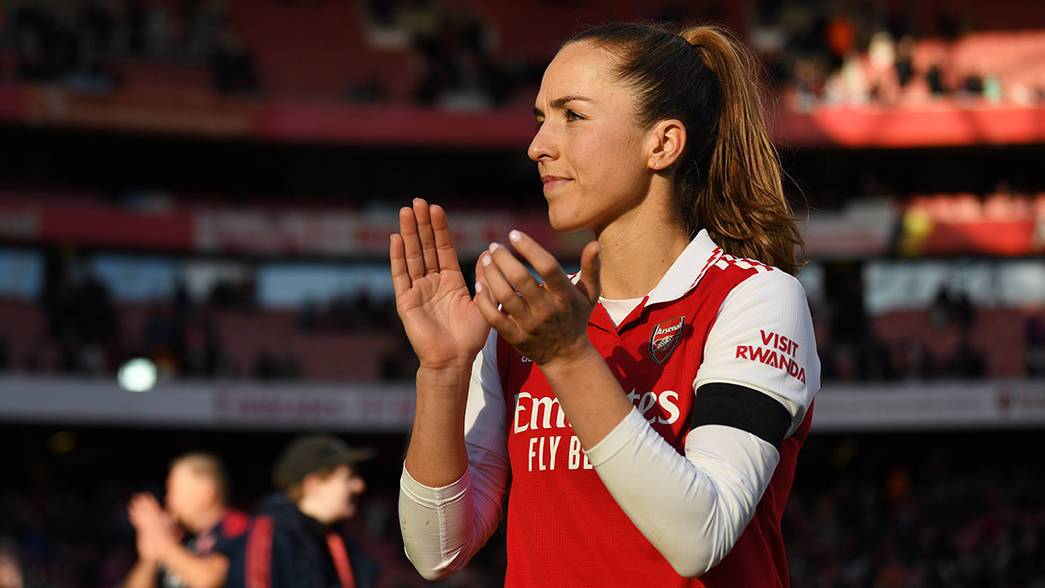After winning the Euros with the Lionesses, Lotte Wubben-Moy knew that more needed to be done in order to secure a sporting legacy for young girls in the UK.
Lotte and her fellow Lionesses wrote to the UK government asking to improve opportunities for girls to play football at school and this International Women's Day, the government has pledged that all schoolgirls will have equal access to football and sport.
Here is Lotte's open letter, reflecting on this achievement and what it means for the future:
When I was seven I would walk in the door from school and immediately leave again to go and play football in the street. I would simply shout downstairs to my mum that I was off out to play and fly out the door. She knew where I was, two streets over in our small neighbourhood in Bow. I would always return a couple of hours later, five friends and two grazed knees the richer.
I look back and can’t help but think how lucky I was to have found my place growing up. Football was part of my identity, it helped me find a clear path in one of the biggest cities in the world. I think I’d have been pretty lost without it. I learnt so much about the complexities of modern society and of the person I would become, during those games in the streets. The jostling for who would play in goal, what was defined as a foul (and what often wasn’t), and the fighting for my place. I grew in confidence and motivation to constantly improve and it was incredibly empowering to hold my own against all the boys (not that I would have ever considered that at the time).
I do however remember thinking ‘all the other girls in the local area are crazy not to join in playing with us. I couldn’t understand it. Why didn’t they want to earn the respect of other local kids our age? Or have the chance to make friends with kids from all over the area? In hindsight, I am sure many girls would have walked past us wishing they had the confidence to play along too.
Stories of battling to play reverberate around our Lionesses changing room: from playing in boys' teams to starting up our own teams, to travelling continents to find adequate girls' coaching, this was an experience many of us have lived and a battle we have all fought. It has shaped us, but we want better for the future.
Football has given me so much and I feel indebted to ensure it gives as much, if not more, to others. And that is exactly why we 23-Lionesses put pen to paper, writing to the Prime Minister in demand of equality. We were determined to ensure every young girl across the nation has equal access to football when they go to school. To ensure that our European Championship win could leave a legacy past last summer’s blurry few days of celebration and hoarsely singing "It's coming home" in Trafalgar square.
I never for one moment thought it was possible to become a professional footballer all those years ago. No sooner would I have believed you if you’d said I’d be writing letters to the Prime Minister. But I’m part of a generation who knows no end to our dreams. We dreamt of becoming European champions. We harbour dreams for this summer’s World Cup. And we also dream of a time when girls watch the WSL on a Sunday afternoon and run into school on a Monday morning ready for their shooting drills, emulating their heroes, dreaming themselves, and dreaming with no limits.
This is another victory we now believe we have achieved. And perhaps it will grow to become our greatest ever victory. We will do everything in our power to ensure that this is the case.
As I grew up the street was traded for real pitches. The football teams I was part of moved predominantly outside of the M25. This meant that the once-post-school run around the corner was replaced by an ever-growing dependence on my privilege; my mum would drive me to training three or four times a week, often taking along other girls from the local area with us. We could afford the many and frequent team payments, new boots, and match fees. And most importantly I always had my parents’ full support.
But I know there will be so many girls out there who are not so lucky. Having witnessed it first hand, I know this necessity to travel has already ended so many young players’ careers in London and perhaps stopped many more from ever beginning. This is one of the reasons I so strongly believe in the need for girls’ football at every school across the nation.
Our letter and lobbying reached the ears of those most powerful within the country. As of today's news from Number 10, millions of girls in schools across the nation will now finally have equal access to football at school. They will be able to do what their male classmates have been able to do for years: play football at school.
Picture a playground full of young girls kicking footballs around in London and pick out a future Lauren James. A playground in Cumbria, pick out that future Georgia Stanway. A playground in Wigan, who is the future Ella Toone? Imagine how many future Lionesses you could pick out in every playground across the nation with every school now offering equal access to football.
Well, that is now the reality the Lionesses squad of 2022 dreamt of. But the victory is so much greater than that, because many don’t play football dreaming of a professional career. It's the camaraderie, the adrenaline, and the endorphins that I felt as a young girl. It is the teamwork, the social networking, and the lifelong friends made on the pitch. It is the beautiful game, that I know so well.
By making girls' football more accessible, we have opened a crucial door for the growth of women’s football as a whole. And if we want to look at our Lionesses and see a team that represents the whole nation, I believe this is one among many key steps to ensuring our national team becomes more diverse, stronger, and more successful many years into the future.
Long live street football. I’ll forever be indebted.
Let Girls Play,
LWM
Copyright 2023 The Arsenal Football Club plc. Permission to use quotations from this article is granted subject to appropriate credit being given to www.arsenal.com as the source.














